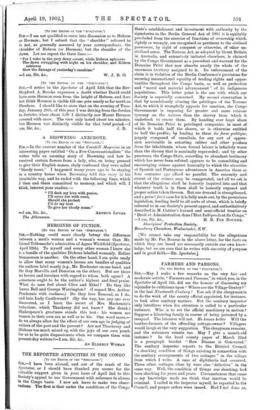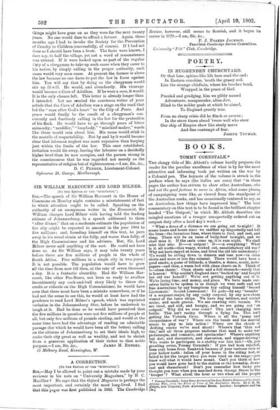FARMERS AND PARSONS.
[To THE EDITOR OP THE " SPECTATOR."]
SIR,—May I make a few remarks on the very fair and moderate article, " Farmers and Parsons," in which you, in the Spectator of April 5th, did me the honour of discussing my rejoinder to criticisms upon " Where are the Village Gentry ?" in the last Nineteenth Century You ask if the clergyman is to do the work of the • county official appointed, for instance, to look after sanitary matters. But the sanitary inspector only interferes when his attention is called to a particular nuisance. Who is to set the official machinery in motion? Suppose a labouring family in course of being poisoned by a cesspooL The labourer will not. He knows better Will the brother-farmers of the offending cottage-owner? Villagers would laugh at the very suggestion. The clergyman remains and the nuisances remain too. May I give a month-old. instance ? In the local county paper of March 22nd is a paragraph headed " How Disease is Generated." The sanitary inspector reports to the District Council " a shocking condition of things existing in connection with the sanitary arrangements of two cottages " in the village from which I write. A case of diphtheria had occurred. Three other cottages close by were also "defective" in the same way. Well, the condition of things was shocking, bad been shocking for years and years. Circumstances that came to my knowledge made me think that inaction would be criminal. I called in the inspector myself, he reported to the Council, and proper orders were issued. Had I not done so, things might have gone on as they were for the next twenty Years. No one would dare to offend a farmer. Again, three months ago I had to invoke the Society for the Prevention of Cruelty to Children (successfully, of course). If I had not done so I should have been a brute. The facts were known, I dare say, to half the village, yet not a word of remonstrance was uttered. If it were looked upon as part of the regular cluty of a clergyman to take up such cases when they came to his notice, by simply calling in the proper authority, such cases would very soon cease. At present the farmer is above the law because no one dares to put the law in force against him. You will say that by doing so the clergyman would stir up ill-will. He would, and abundantly. His vicarage would become a Cave of Adullam. If he were a man, it would. It is the only chance left. This letter is already longer than I intended. Let me remind the courteous writer of your article that the Cave of Adullam was a stage on the road that led the " man after God's heart to the City of Peace. And peace would finally be the result of a clergyman's con- sistently and fearlessly calling in the law for the protection of his flock. He would have to go through years of bitter animosity; "muddler," "busybody," "mischief-maker," words like these would rain about him. His name would stink in the nostrils of respectability. But by and by it would become clear that inhuman neglect was more expensive than keeping just within the limits of the law. This once established, irritation would die away, leaving the labourer on a decidedly higher level than he now occupies, and the parson strong in the consciousness that he was regarded not merely as the representative of religion but of righteousness.—I am, Sir, &c.,
D. C. PEDDEE, Lieutenant-Colonel.
Ogbourne St. George, Marlborough.











































 Previous page
Previous page